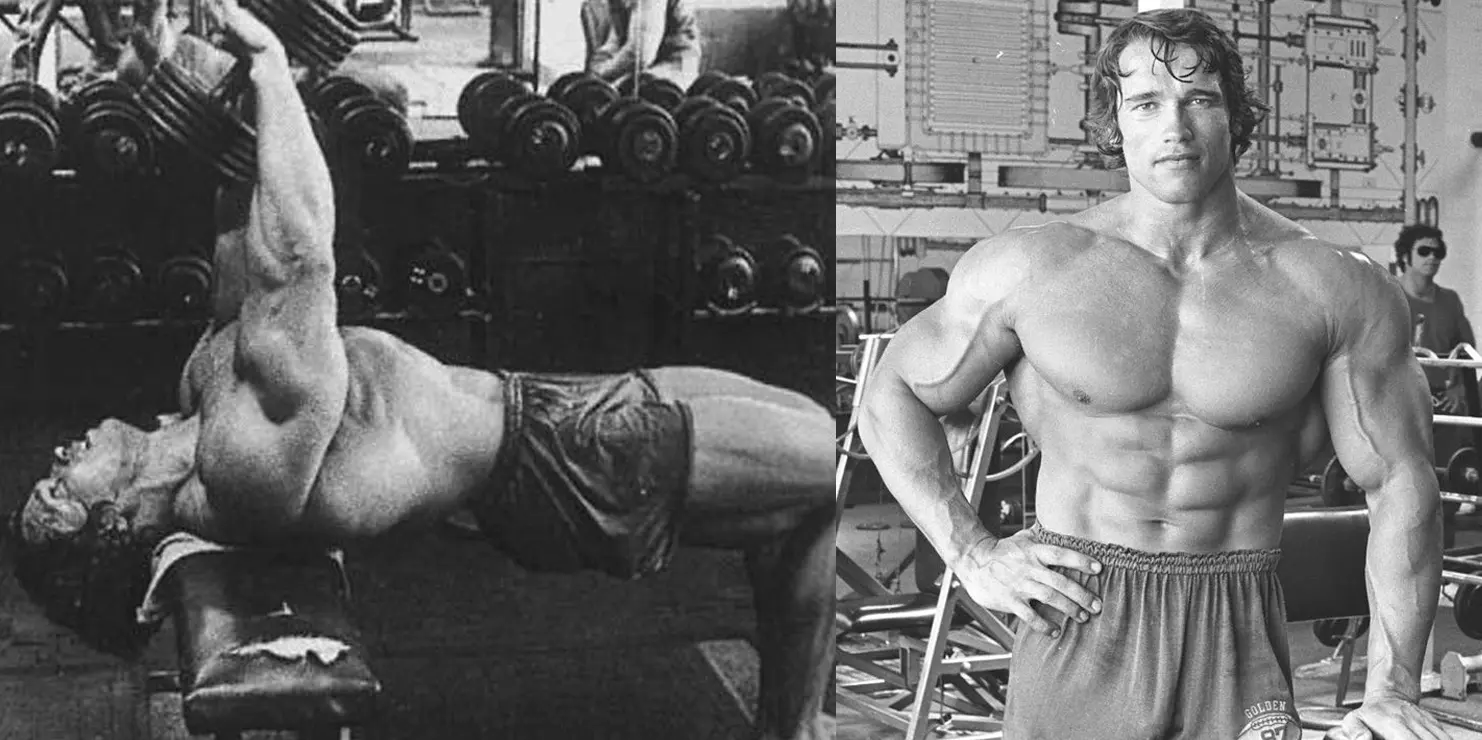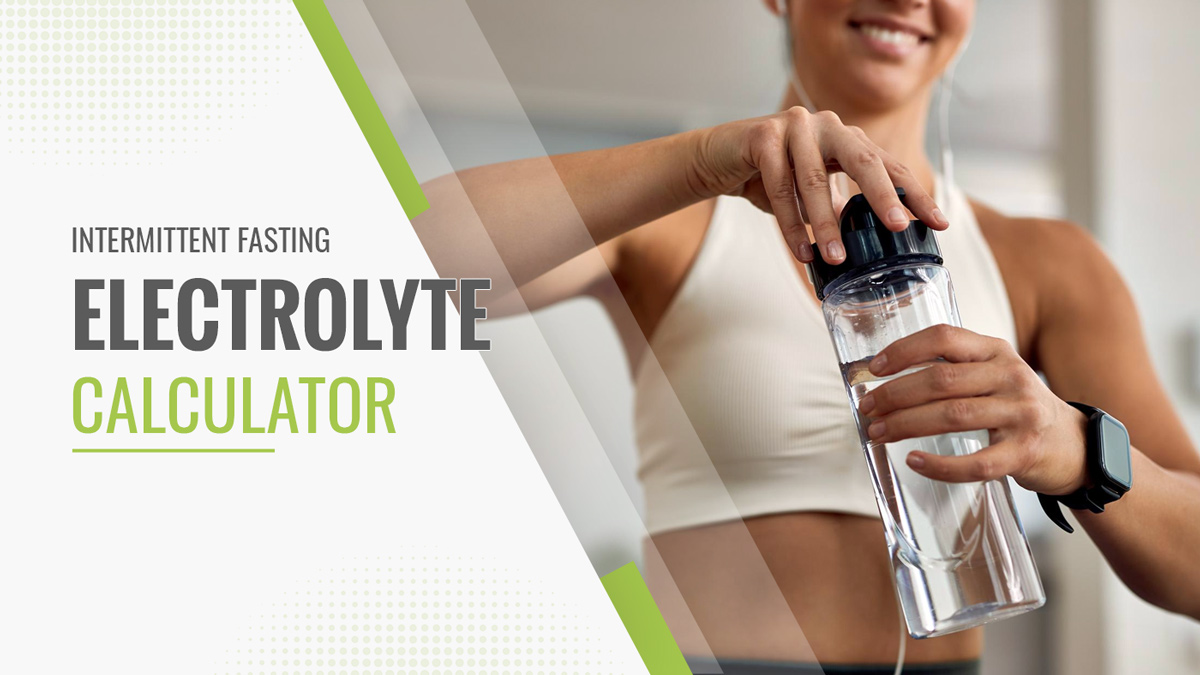The dumbbell pullover sure isn’t the most common exercise used to build a big chest and lats. But we don’t always follow the crowd and we believe this movement absolutely has its place in a workout routine.
You can, indeed, utilize it to build muscle and strength, so we’re going to show you just how to do this with a guide on what you need to know about the dumbbell pullover…
How To Do The Dumbbell Pullover
Here are step-by-step instructions for the dumbbell pullover. Keep in mind, there is a slight difference in how this exercise should be performed depending on whether you’re targeting your chest or lats but we’ll explain.
Starting Position
Before you start the movement, place the dumbbell standing up on either end of the bench so that when you lie down you can easily grab it with both hands.
- Lie perpendicular on a flat bench so that only your upper back is on the bench and your feet are planted on the floor while making sure your torso is parallel to the floor.
- Grab the dumbbell with both hands holding only one end and hold it above your chest similar to if you were doing a press.
- With your elbows tucked at about 45 degrees to your torso, slowly bring your arms back behind your head only to where the dumbbell is level with your head and no lower if you’re working your chest. If working your lats, bring the dumbbell a little lower to feel a stretch in them.
- Now bring the dumbbell back over your head while contracting your chest muscles and pretend that you’re pushing your hands together while also slightly internally rotating your shoulders. The dumbbell should end up directly above your chest as it was during the starting position. If targeting the lats, however, flex them as you come up and don’t try and squeeze your hands together.
Repeat.
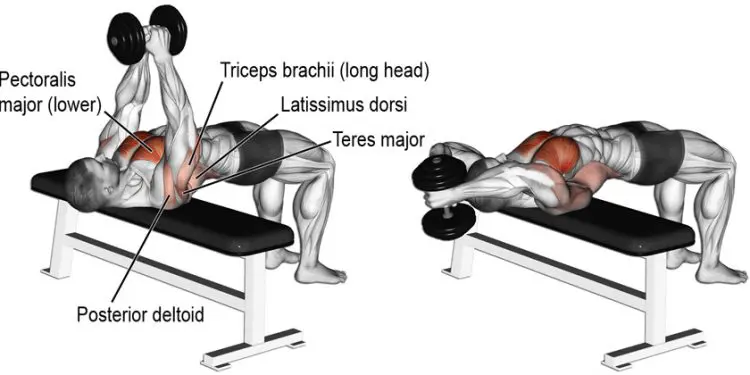
Exercise Tips:
- Start with a relatively lightweight if new to this movement as it can be very difficult and dangerous to start with a relatively heavy dumbbell. Plus, you won’t feel the muscles working as much and you won’t be able to perform the movement through its entire range of motion.
- The effectiveness of this exercise is very much dependent on mind/muscle connection and ensuring you’re focusing on the target muscle by making small adjustments to your body position.
Check out the video guide:
5 Benefits of The Dumbbell Pullover
1. Hypertrophy
We all want the benefit of gaining muscle otherwise we wouldn’t consider adding an exercise to our repertoire. And the dumbbell pullover is a darn good exercise for building your chest and lats.
So, stick to a rep range of between 8-20 reps with this exercise and you’ll definitely reap the hypertrophy benefits.
2. Increased Strength
If the movement is challenging you’re increasing strength but you’ll need to continue increasing the weight (progressive) and/or repetitions within a strength-building rep range which is typically fewer than 10 reps.
But you definitely don’t need to stick with just one rep range so mix it up and incorporate heavier pullovers once you become more advanced.
3. Mind/Muscle Connection
This is one of those exercises that you really have to focus on in order to engage the muscles. Although, you definitely have to with all exercises. However, since you have the option of targeting more of either the chest or back, you have to be able to understand how to engage either muscle to get the most benefit.
4. Trunk and scapular stability
Due to the body position, you’ll have to be able to engage your core muscles to stabilize your trunk; which is important especially for the heavier sets. Then, like any back or chest exercise, scapular stability is necessary to prevent excessive protraction of the shoulders and ensure the ball and socket joint functions optimally.
Having these two things on point is going to improve your performance, allowing you to better target each muscle.
5. Improves shoulder mobility
The act of reaching behind your head while your hands are positioned close together definitely requires you to have decent shoulder stability. And by incorporating this exercise in your workout regime, you’ll be improving shoulder movement in the eccentric position.
However, not everyone will be able to effectively perform this movement due to structural issues which cause very limited shoulder mobility, and in this case, it should be addressed before attempting the dumbbell pullover.
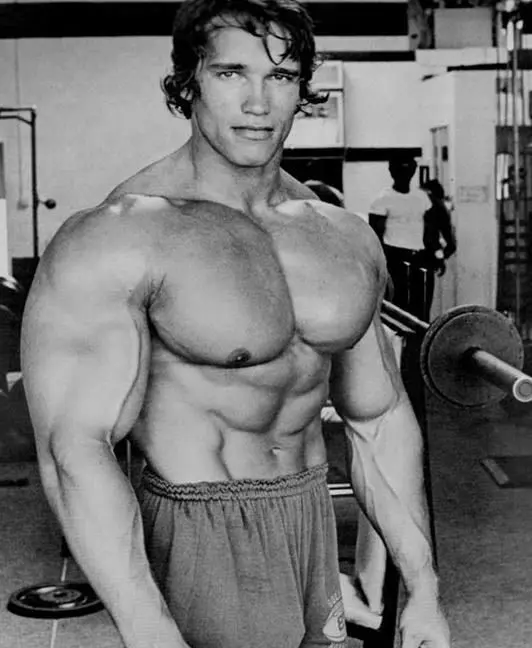
Variations of The Dumbbell Pullover
Fixed barbell pullover
You can do this exercise using a fixed barbell but there a few things to note if you decide to go this route.
Since you’re using a barbell, hand placement matters for which muscle you are trying to target. A shoulder-width grip will naturally be better for the lats since this is generally an ideal grip for any exercise where the goal is to work this muscle of the back.
To better target the chest though, we recommend keeping your hands much closer to get good engagement and contraction of the pectorals.
Parallel dumbbell pullover
For this variation, you’ll lie on the bench as if you were doing the bench press so that you’re positioned parallel with the bench. Also, you can use a decline bench to emphasize more of the lower pecs.
This variation removes some of the glute and core engagement which is more necessary in the perpendicular version. Although, you still want to keep a tight core regardless due to the nature of the movement.
Dumbbell pullover using a stability ball
You’ll definitely need that core and glute engagement for this variation. A stability ball requires the recruitment of more assistance muscles. Although, you definitely don’t want to overextend your spine as the arm motion should still be the main part of the lift. But, you can get a little more stretch with this variation.
However, it’s probably best to stick with lighter to more moderate loads to ensure optimal execution since a ball obviously isn’t as stable as a bench.
Cable Pullover
This one might be a better alternative when targeting the lats rather than a pullover variation. But it’s an amazing exercise nonetheless and it’s excellent for improving scapular stability along with building the lats.
With this exercise, you’re standing while using your lats to press the bar down keeping your arms extended in front of you.
How To Include The Dumbbell Pullover In Your Workout Regime
Something to keep in mind about the dumbbell pullover is that while it is a great exercise for building your chest and lats, it’s definitely not going to replace your presses or rows.
So, with that being said, you should use a weight that allows you to safely and effectively extend your arms behind your head before bringing it back up. And you won’t be able to use near the weight you could during a compound press or pull.
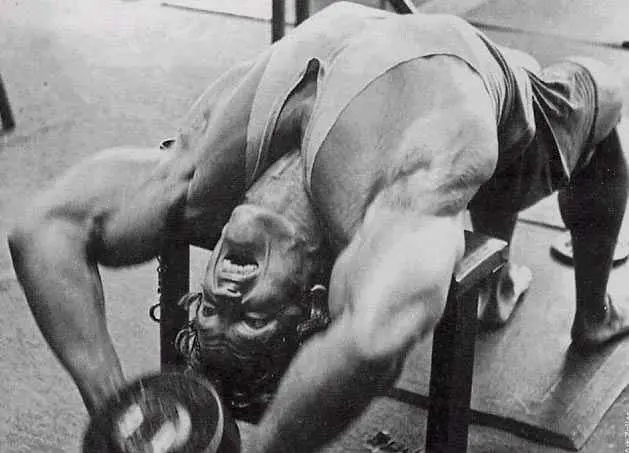
The dumbbell pullover is closer to fly in a sense but you can still use a challenging weight to get the job done and building muscle is all about using different techniques to stimulate growth in different ways.
So, do yourself a favor and experiment a little.
Sometimes you’ll want to use lighter weights and do more reps so that you can focus more on activating the muscle and developing a mind/muscle connection. This is also great for getting a big stretch specifically when targeting the lats.
When focusing on hypertrophy, stick with the 8-12 rep range to really challenge your muscles while also implementing sufficient time under tension.
Hypertrophy rep ranges are also great for developing strength and if you’re more advanced you could even try for a 5-7 rep range but use caution don’t overextend with this amount of weight in this position.
Wrapping Up
The dumbbell pullover is a must-have exercise for targeting the chest and lats. Heck, if you weren’t doing it before then maybe you’ll like it so much that it becomes a regular exercise in your mass and strength-building arsenal.
Remember, it can’t replace a press or row but it does a darn good job of allowing you to hit your muscles from a different body angle than what you typically may be used too.
Interested in measuring your progress? Check out our strength standards for Bench Press, Dumbbell Pullover, Barbell Pullover.
Tip: If you're signed in to Google, tap Follow.


